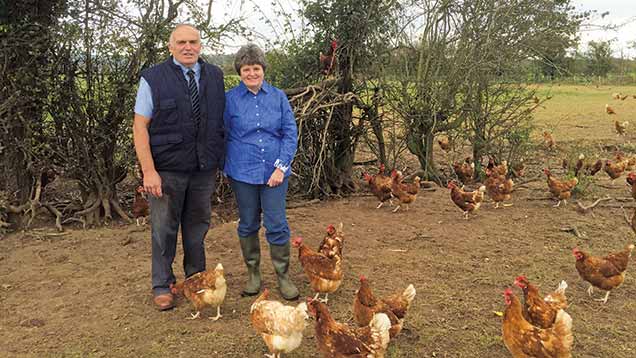Top free-range egg producer shares secrets of success

Nestling down a long drive within sight of Stratford-upon-Avon, Willow Farm is a former cattle and arable farm that is now home to 28,000 laying hens.
Consisting of two flat-deck, free-range poultry houses – one with 12,000 birds and a second with 16,000 – the Gaden family have more than doubled the size of their business since 2003.
The birds – Bovans Brown which are hatched by Joice and Hill and reared by Noble – range on opposite sides of each house, so there is no contact and no bird migration.
See also: Top free-range egg businesses honoured by Bfrepa
The flocks swap over every ten to 12 weeks, following worming, to the fresh range on the other side of the buildings, which means the used range can be harrowed and reseeded, as necessary, on an ongoing rotation.
Anthony and Lorna Gaden and their 16-year-old twins David and Craig believe in keeping control of every facet of the operation – from who accesses the farm, to the weekly weighing of their flocks.
It is an approach that has led to multiple awards, including a Bfrepa Producer of the Year award in 2014.
Fundamental to the success of the business is a belief that “the more you put in, the more you get out”. “This is especially true at the beginning, when time spent with the flock is rewarded later on,” says Mrs Gaden.
“We have learned that attention to small details add up to a better-managed flock, which results in a better return.”
This philosophy is extended across the whole operation in a set of proven management practices, which the family believe are well worth the extra effort.
 Biosecurity
Biosecurity
For example, the Gadens take control of all visitors to the farm and insist on the strict discipline required to keep the site free of dangers from the outside.
As well as the usual precautions, such as mandatory feet dipping and overalls for visitors, additional measures include:
• Electronic farm gates, access by code only
• Designated footwear for each of the two houses
• Designated outdoor and indoor footwear and overalls
Furthermore, Willow Farm operates an all-in, all-out system. Both houses run on the same cycle, so after depletion there is no poultry on site. After the houses are emptied, cleaned and disinfected, they are rested for about two weeks. This allows the disinfectant to work and the range to recover.
“This longer turnaround has a cost, but we believe it is worth it in the long run,” says Mr Gaden.
Early warning signs
The Gadens also believe in spending a lot of time with the birds when they first arrive. This intensive period of attention is an investment that pays off.
“Getting to know a flock means any change in behaviour is spotted early,” they say. The Bovans deals with change well and can recover the flock’s performance quickly, they add.
Observing a strict daily pattern to make birds comfortable and adapt quickly to their new environment is another discipline they believe is conducive to a settled and productive flock.
In order to get the earliest possible warning of any change in performance, the Gadens monitor egg weight each week themselves. This is a better practice than waiting for, and relying on, grading returns from the packing station, they say. It means they can adjust feed and lighting regimes at the earliest possible moment.
Unlike on many farms, the egg belts at Willow Farm are run twice a day – morning and afternoon. “This obviously means more work, but there are real benefits for us,” says Mr Gaden.
“These include more even daily egg collections, spotting any changes in egg laying behaviours and cleaner eggs. In addition, it helps early detection of any equipment failures that may affect egg quality.”
A partnership approach
The business of caring for their flocks is very much a family affair, with one of the twins, Craig, planning a career in agriculture, starting with a course at Moreton Morrell Agricultural College.
However, the Gadens are happy to draw on outside advice, enjoying a three-way partnership with Penny Humphrey of Joice & Hill, and Andrew Dixon, their feed specialist. Ms Humphrey visits the rearing farm regularly as the pullets are developing, and attends weekly weighings with Mr Dixon.
After the birds are weighed, everyone involved sits down to discuss any feed changes, demonstrating the team work between the hatchery, the feed company and the producer.
Summary of flocks at Willow Farm(flocks depleted at 72 weeks) |
|
| Date flock housed | Egg output per hen housed |
| 2010 | 326.8 |
| 2012 | 309 |
| 2012 | 320 |
| 2014 | 319.8 |
